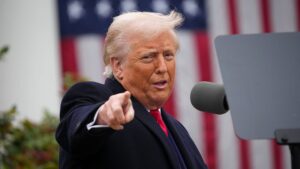The Looming Threat of Tariffs: Are We Heading Towards a Recession?
At Extreme Investor Network, we pride ourselves on cutting through the noise and providing our readers with unique insights and actionable strategies. Today, we turn our attention to a pressing topic that could significantly impact your investment strategies and financial outlook: the aggressive tariffs implemented during President Donald Trump’s administration and their potential economic repercussions.
A Shift in Economic Forecasts
Wall Street analysts are increasingly echoing concerns that the unexpected imposition of tariffs on U.S. trading partners may stifle economic growth and elevate recession risks. A notable sentiment among economists suggests that rising inflation, coupled with heightened policy uncertainty, will dampen consumer demand and hinder business investments. Consequently, these factors pose a substantial risk to already fragile economic growth.
Projections indicate that if these tariffs remain in place, not only could the U.S. face a possible recession, but the ripple effects may also reverberate globally. As Seth Carpenter, Chief Global Economist at Morgan Stanley, aptly put it: “A US recession would mean a global recession.”
Navigating Mixed Signals: The Optimistic vs. Pessimistic Outlook
While many economic forecasters are painting a grim picture, a glimmer of optimism remains. Some analysts believe that negotiations could lead to lower tariff rates, merely resulting in a slowdown rather than an outright recession. However, this perspective hinges on the assumption that all parties are willing to engage in constructive negotiations.
On the flip side, the worst-case scenario involves the administration maintaining a hardline stance, exacerbating economic slowdown factors, and pushing us closer to recession. This is where our readers must be vigilant and prepared for market fluctuations as foreign trade dynamics evolve.
Rising Recession Probabilities
Goldman Sachs recently escalated its recession forecast, now predicting a 45% chance of economic contraction if tariff rates are not negotiated downward. If we consider the dire implications of escalating tariffs on financial conditions and consumer confidence, it’s clear that portfolio diversification and proactive measures should be at the forefront of every investor’s strategy.
Their forecast includes a stark reduction in GDP growth to just 0.5% in 2024 and a core inflation rate expected at 3.5%, significantly above the Federal Reserve’s 2% target. As the inflationary pressures mount, it’s crucial for investors to reassess their holdings and stay informed about shifting economic realities.
The Labor Market: A Key Indicator
One of the primary catalysts for potential recession is the labor market. Analysts at TS Lombard are sounding alarms about the possibility of companies resorting to layoffs in response to declining sales. This reaction could set off a "domino effect" leading to a downturn, as higher unemployment typically leads to decreased consumer spending.
It’s essential for investors to keep a close eye on employment statistics, as they can serve as critical indicators of overall economic health. A sudden spike in layoffs could prompt widespread market reactions, impacting stock valuations and investor sentiment markedly.
The Federal Reserve’s Role
Given the current climate, the Federal Reserve’s next moves will also be a significant determining factor in the economic landscape. While there are calls for interest rate cuts, Chair Jerome Powell has suggested a wait-and-see approach, emphasizing the need for careful analysis of the evolving economic indicators. Be prepared for potential policy shifts that could directly impact your investment strategies.
Preparing for What Lies Ahead
At Extreme Investor Network, we believe in the importance of staying informed and agile in uncertain times. Here are some proactive measures you can take:
-
Diversify Your Portfolio: As the economic landscape shifts, consider diversifying into sectors that may be less impacted by tariffs and economic slowdowns, such as utilities or consumer staples.
-
Monitor Economic Indicators: Keep abreast of key economic indicators such as unemployment rates, inflation data, and consumer confidence indexes. These metrics will provide insight into the direction of the economy.
-
Reassess Risk Tolerance: In times of economic uncertainty, reassess your risk tolerance and investment goals. Are you inclined to take more conservative positions, or are you willing to explore higher-risk opportunities for potential gains?
- Consult Professional Advice: Engage with financial advisors who can provide tailored insights based on your specific situation and market conditions.
In conclusion, while the economic landscape may be fraught with volatility, informed investors can leverage these challenges to identify potential opportunities. At Extreme Investor Network, we are committed to equipping you with the insights and strategies necessary to navigate these uncertain waters successfully. Stay tuned for more updates and analyses on how to safeguard and grow your investments in an ever-changing economic climate!

